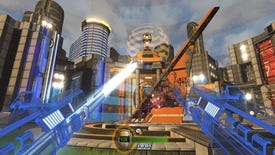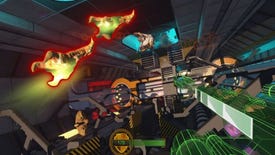Wot I Think: Retrovirus
Antibiotic
Cadenza's six-axis FPS hasn't taken the easy path. But via its circuitous route Retrovirus is now out on Steam for about £14, and I've pew-pewed my way to the very end. With massive improvements since the last time we saw it, just wot will I think?
Last November I had my hands on Retrovirus - the six-axis shooter than made it despite a Kickstarter disappointment. Finding funding through selling their alpha via Gamestop (which is apparently a thing), this version of the game was, sadly, disappointing. But forget that. Because the award for Most Improved Game Since Alpha unquestionably goes to Retrovirus. The improvements are marked and many, the whole game feeling significantly more satisfying to play, performance issues mostly resolved, much better balanced, and with some very smart use of resource managing when it comes to weapons. If only it knew when it was time to leave.
You are, in essence, a virus application. A desktop PC has been invaded by a malevolent worm, doing enormous damage to the system, corrupting vast amounts of the infrastructure, and spawning viral enemies throughout for you to clean. As I noted previously, the similarities with Monolith's magnificent Tron 2.0 can't be a coincidence, especially with XP added in the form of data acquisition, and the backstory being told by found emails. But by release, Retrovirus is very much its own game, a healthy distance from both obvious inspirations, the other obviously being Descent. It plays like neither, and that's certainly one of its biggest strengths.
Gone is the peculiarly sedate nature of the alpha, but not entirely - the game can get extremely frantic, but there's an all-permeating sense of calm too. If things get too mad, you can generally back away from an area, deliberately lead off a few enemies and take them out in a safer place, before continuing your assault on a particular chamber.
Assaults take the form of clearing out the bulbous purple infections that worm their tentacles throughout the metaphorical realisation of a computer's innards. Shooting these inert blobs causes their growths to wriggle away, which is infinitely satisfying. But blighting your attempts to do this are the very many enemy types, each attacking in a specific fashion, each requiring a different approach to deal with. Which is why you're also blessed with an ever-growing arsenal of weapons, each very distinct, appropriate in different situations and against different enemies. And it's perhaps here that Retrovirus really shines the brightest - those weapons range from a regular laser pistol to a mad, mine-firing canon-thing, to some manner of shotgun, and what's I guess a sniper rifle. Each can then be embellished with upgrades, really quite significantly altering the way they fire, and indeed each has a secondary fire activated with the game's scan. But each weapon is also restricted to a very small, rapidly recharging pool of energy, and it's this that forces tactics into what otherwise might have been a blind shooter. You have to develop tricks and techniques for getting the most out of the weapon, since instant-refills are limited. Killing an enemy, however, gives you a surge in energy, so combat becomes about ensuring you're attacking the right enemy, the right amount, so you'll have enough firepower remaining for the next. And when attacked by big swarms of multiple enemy types, that requires very fast thinking.
There are two tales being told. One is the immediate virus attack, which is narrated by a splendid AI who guides you for most of your journey. Along the way, as you go through various sections of the computer (which, like everything else about this concrete-and-rebar-strewn PC, make no attempt to align to reality) like the email, the web browser, etc, you encounter other voiced programs. And since the alpha's dreadful acting, things are enormously improved, with not a dud voice throughout. And the browser's adorable ditsy burbling is a real highlight, especially when met by weary scorn from your constant aural companion. The worm you're fighting is especially terrible, and causing incredible harm, all given pleasing meaning from the reactions of the anthropomorphised code.
The other tale is an attempt at some sort of backstory spelt out in the emails. But, well, I couldn't tell you a single thing about it. If you don't find every hidden email in a level, you'll miss out crucial communications, but then nothing told in there is compelling enough to care either way. Importantly, it's superfluous, rather than particularly problematic. The immediate narrative, the characters around you, and the present threat, do all that's necessary. This side can be safely ignored without feeling like you're missing out on anything.
Also hugely adding to the sense of progress are the locations that appear around halfway through the game. After (and this is a recurring issue, appositely enough) spending far too long in the earlier sections, emerging out into the CPU is a refreshing change of scene. A large, gorgeous courtyard sits in front of the Cathedral - big, luscious locations not just made of corridors, fun to explore, and particularly novel in a six-axis game.
And then it really starts repeating itself. It's so frustrating that Retrovirus's biggest fault is that there's just too much of it. With some judicious editing, and some slain darlings, its 12-or-so hours could have been trimmed to a much tighter 9 or 10, resulting in a much more satisfying game. Not because 12 hours is too long - of course not - but it's too long for what's available here. Locations start repeating themselves, levels ask you to backtrack through previously cleared areas, now needing clearing again, and worst, it keeps teasing you with false endings. That's brilliant when you're thinking, "I hope this never ends!" but less effective when things have felt like they've been winding down for a while. The revelation of a final final boss is one that I certainly didn't meet with joy, and that's a shame because some of the areas in that final section were absolutely fantastic. Then repeated three times.
This is such a stellar step forward since only three months ago, gone from a peculiarly quiet and distracting game to something that feels as though it could have been born of those shooter glory days in the early 2000s. There are still a few technical issues - it crashed a couple of times for me, and a couple more started temporarily freezing until I force-quitted my way out. And it's unquestionably bloated, padding itself out where it just didn't need to, where it already had enough superb content to see it through. But it's also a really superb FPS, and blessedly a six-axis one, made intricate through some really genuinely smart weapon design of the like not seen in a shooter for far too long.














